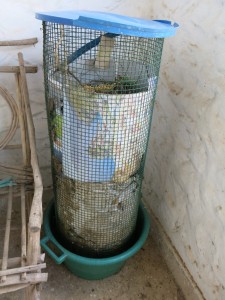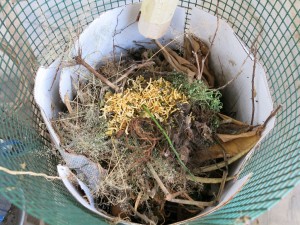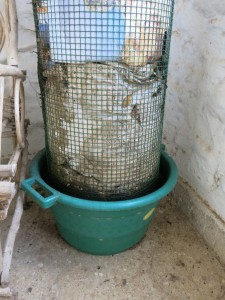The Zanzibar Municipal Council (Manispaa) has capacity at the moment to collect only 30% of the waste produced in Stone Town.
But 80% of the waste produced in Stone Town is organic!
All our kitchen waste and cardboard boxes could be turned into compost! Instead, it is blocking up the waste system, and the organic material is what makes waste smell when it rots in uncollected piles in abandoned corners, attracts pests which spread disease – and contaminates the groundwater, which hundreds of people drink.
There are moves afoot to establish some kind of municipal scale urban composting system with different aid agencies and local counterparts exploring the potential. It will be fantastic when it is in place, and Sustainable East Africa, our partners Manispaa Jamii Vikokotoni, and many others are hard at work to find a solution. But this will of course take some time to establish.
However, there is absolutely no reason why we can’t start doing something about it now.
Most of you who live in town probably believe you can’t compost because you haven’t got a garden – but I can reassure you from experience that it doesn’t matter at all. As long as you have a tiny corner of outside space, then you have room to make a compost bin. I will show you how I did it.
I built a cheap and simple bin on my balcony – and it works extremely well. As long as you don’t let it get too waterlogged, and cover kitchen waste with leaves, a layer of soil, brown paper bags or brown cardboard, it won’t smell, and it won’t attract flies.
Top tip: keep a small bucket in the kitchen lined with a paper bag to collect the peelings in, and you can put it, bag and all, straight in the composter, so there’s no mess!The great thing about composting is that as the material breaks down, its volume gets smaller and smaller, so even quite a small bin will take a seemingly infinite volume of waste. I’ve had mine for over a year and we still haven’t filled it!
Your organic waste will be separated from the rest of your rubbish – so the kitchen bin won’t smell (meaning you don’t have to empty it as often). And if you recycle the plastic and metal and glass as well then you will find you only need the tiniest bin for the rubbish that is left. Honestly – almost all of the waste you produce can – and should be – recycled or composted.
Still unsure? Here’s my compost bin which has been consuming all our organic waste for the past year. And I shared the idea with Suzanne Degeling from Kawa Tours, who tried it out successfully, and she has kindly written a step-by step guide with illustrations so you can easily follow to build one yourself.
What are you waiting for? Download a .pdf guide to building your simple composting bin here!



As Suzanne did, I suggest you make two. When the first is full, start filling the second, by which time the first one should be ready! If you have a garden – it’s even easier to make a compost bin. Use exactly the same approach, minus the bucket at the bottom. Worms and other useful creatures will move up from the soil beneath and help your compost break down even faster.
Haven’t even got the outside space for that?
If you’re feeling inspired, but have no outside space at all and don’t think this would work for you, how about this easy wormery idea! There’s no need for a square box as big as this: just drill small holes in a bucket and its lid for ventilation, and keep it on a tray. This could even be kept in the kitchen under the sink, as the article suggests. To find the worms to start it off, you will need to visit someone’s garden or a farm and dig a little. But once you’ve got happy worms they will breed rapidly and you can share them with other people.
The trick with any kind of composting is to make sure there’s a good mix of brown stuff, like dry leaves or cardboard, and green stuff, like vegetable peelings and other kitchen waste. It should be damp, but not wet, that flies can’t get to the waste, and that there is plenty of space for air to circulate. If you try it – let us know, and we can share your pictures too!
I am sorry that these materials are only in English at the moment, I will upload Kiswahili translations as soon as they are ready! If anyone is interested to help out with translations of these kind of materials, I would love to hear from you. In the mean time, for anyone with a garden, there is a fantastic Kiswahili guide to making compost that you can read or download here.

